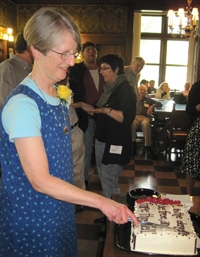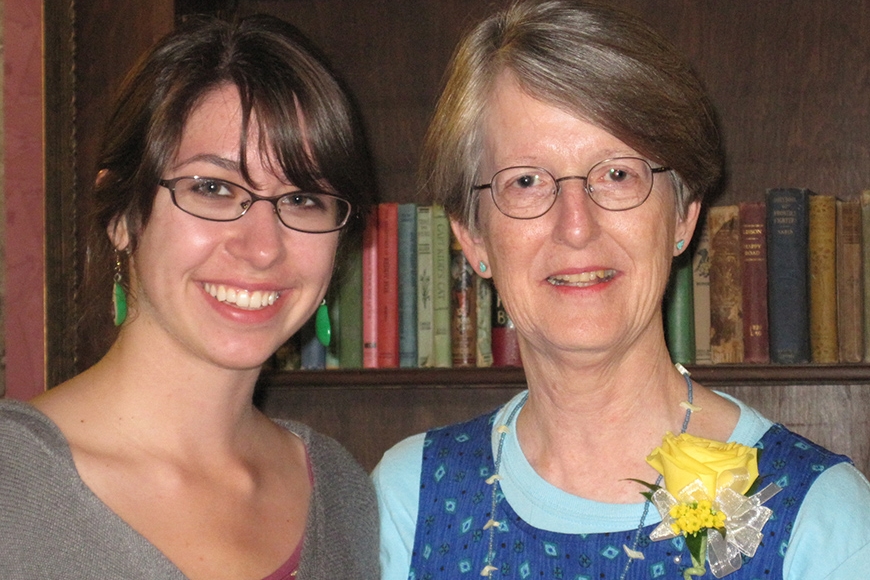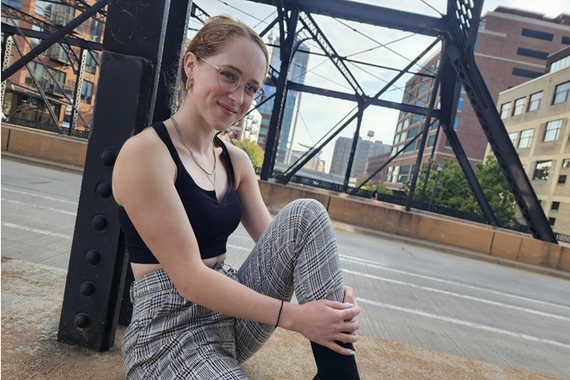Commencing the Next Stage: Beverly Atkinson
On the afternoon of May 4, 2010, in the Upson Room of Walter Library, the Department of English celebrated Beverly Atkinson (MA 1971), upon her retirement after 37 years of service as an undergraduate adviser and later Associate Director of Undergraduate Studies. Steve Atkinson (MA 1972), her husband and a retired CLA Senior Accountant, gave a stirring speech that described meeting Atkinson in an English graduate seminar in the early 1970s. Undergraduate peer adviser Moira Pirsch performed a poem she'd written; English staff person Michael Walsh (MFA 2005) read "Ode to the Book #2" by Pablo Neruda.
Advising peers gathered around the woman who was a primary organizer of the University-wide Advising Network and the more informal web of CLA department advisers. Former English advisees greeted her with hugs. Professor Julie Schumacher noted that, in an informal survey, the words most commonly cited to describe Atkinson were "kind" and "generous."

But perhaps the most striking moment of the afternoon came when a pale man using a walker entered the room, asked with impeccable timing, "What's the protocol here?" and took the microphone. Retired in 2003 from the English department as a Morse-Alumni Distinguished Teaching Professor Emeritus, Archibald I. Leyasmeyer had undergone, just the week before, hip replacement surgery. "I might be leaning on a walker, but my soul is clapping and singing," he said, referencing a Yeats poem. "During my first term as Director of Undergraduate Studies in English, back in the early 1970s, I hired Beverly, and that's probably the most important thing I did as director.
"With luminous common sense, a wonderful awareness of a wide range of relevant issues, and a powerful sense of standards, she has been a major force in shaping our undergraduate program and sustaining its excellence. Students love and admire her, for they recognize her commitment to them, her respect for them as individuals, her desire to see them succeed. The University is a better place because of her sustained contributions."
In an interview a week after the celebration, Atkinson smiled at the memory of Dr. Leyasmeyer's speech. "I did not expect that at all," she said, shaking her head. "That's the first thing I have to do: write a lot of thank you notes."
An activist for educational access
Pressed to make general statements about the changes in University undergraduate education since 1973, Atkinson instead gently points to specific curriculum and policy decisions. She mourns the switch from quarter to semester system, which, she notes, "means you have two fewer teachers, two fewer classroom experiences, two fewer courses you could take." And while she appreciates the increasingly accomplished students the U is attracting, she wonders who has been excluded, since the General College was shuttered and average high school grade point scores of freshmen are climbing.
She is optimistic about the current crop of students. "I would say that clearly in the last five years or so students are much more engaged and civically minded, interested in social justice, both local and international," she claims, "which I think is really exciting. And they're striving to see the connection to their education. Maybe that's been true of students before, but now the opportunities are there."
Other gains Atkinson has witnessed include vastly improved student services, especially for students with physical and mental health issues and for veterans. Her own activism within the University has often been around issues of educational access: the English scholarship that bears her name is directed to "non-traditional" students who, she says, "in the broadest sense seem to have more barriers that make it difficult to have the time to develop their skills, their talents."
Atkinson enjoys the new technology that is allowing more integrated advising between CLA and department advisers. "I like how technology can help us do what we do," she observes. "But it doesn't replace personal conversation. Many students will want to take care of something over email, and I'll say, 'You know, let's get together. It's so much more fun, believe me.'
"I will miss the conversations with students," she says, a little wistful. But the woman who climbed Mt. Kilimanjaro two years ago is looking forward to a commencement of adventures new (travel and time with her preschool grandson) and familiar (gardening and books). Because it's Beverly Atkinson, we know it will be done well.



